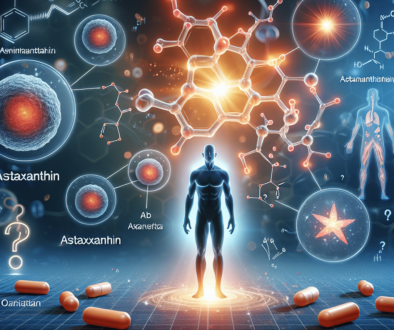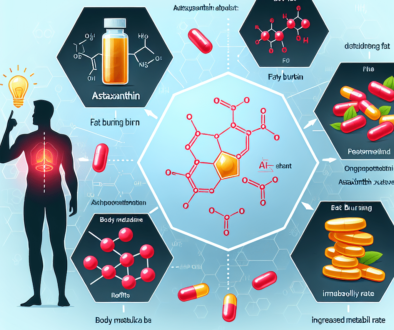Is astaxanthin safe for kidneys? Learn More
Table of Contents
Astaxanthin and Kidney Health: Is It Safe?
Astaxanthin, a naturally occurring carotenoid found in certain marine plants and animals, has gained popularity as a dietary supplement due to its potent antioxidant properties. It’s often touted for its potential benefits, which range from improved skin health to enhanced athletic performance. However, as with any supplement, it’s crucial to understand its safety profile, especially concerning vital organs like the kidneys. This article delves into the current research to answer the question: Is astaxanthin safe for kidneys?
Understanding Astaxanthin
Astaxanthin is a keto-carotenoid that contributes to the vibrant red and pink colors of salmon, shrimp, lobster, and other seafood. It’s also present in the microalgae Haematococcus pluvialis, which is a primary source for commercially produced astaxanthin supplements. As an antioxidant, astaxanthin is known to neutralize free radicals in the body, potentially reducing oxidative stress and inflammation.
The Role of Kidneys in the Body
Before assessing the safety of astaxanthin for the kidneys, it’s important to understand the role these organs play in our health. The kidneys are responsible for filtering waste products from the blood, regulating fluid balance, electrolyte levels, and blood pressure, and producing hormones that control red blood cell production and bone health. Maintaining kidney health is essential for overall well-being.
Research on Astaxanthin and Kidney Health
Several studies have investigated the effects of astaxanthin on kidney health, with a focus on its antioxidant and anti-inflammatory properties. Here’s what the research suggests:
- Antioxidant Effects: Astaxanthin’s ability to combat oxidative stress may be beneficial for the kidneys, which are particularly susceptible to damage from free radicals due to their high metabolic rate and blood filtration function.
- Anti-inflammatory Properties: Chronic inflammation can lead to kidney damage over time. Astaxanthin has been shown to suppress inflammatory markers, which could potentially protect the kidneys from long-term harm.
- Renoprotective Potential: Some animal studies have indicated that astaxanthin may have renoprotective effects, helping to preserve kidney function in the face of various challenges, such as toxins or diseases.
However, it’s important to note that while these findings are promising, most of the research has been conducted on animals or in vitro. Human studies are needed to confirm these potential benefits and establish a clear safety profile for astaxanthin use in relation to kidney health.
Potential Risks and Considerations
Despite the potential benefits, there are some considerations to keep in mind when it comes to astaxanthin supplementation and kidney health:
- Dosage: High doses of astaxanthin have not been extensively studied, and there’s a lack of data on the long-term effects of supplementation. It’s crucial to adhere to recommended dosages and consult with a healthcare provider.
- Pre-existing Kidney Conditions: Individuals with pre-existing kidney conditions should exercise caution with any supplements, including astaxanthin. It’s essential to consult with a nephrologist before starting any new supplement regimen.
- Interactions with Medications: Astaxanthin could potentially interact with certain medications, including those that affect blood pressure or blood clotting. Always discuss supplement use with a healthcare provider to avoid adverse interactions.
Case Studies and Clinical Trials
While there are limited human studies specifically focusing on astaxanthin and kidney health, some clinical trials have provided insights into its safety and efficacy. For example, a study published in the “Journal of Clinical Biochemistry and Nutrition” found that astaxanthin supplementation improved markers of oxidative stress in overweight and obese individuals, which could indirectly suggest benefits for kidney health.
Another study in the “Nutrition & Metabolism” journal reported that astaxanthin supplementation reduced markers of inflammation in individuals with type 2 diabetes, a condition often associated with kidney complications. These studies support the notion that astaxanthin may have a protective effect on the kidneys, but more targeted research is needed.
Conclusion: Weighing the Evidence
In conclusion, the current body of research suggests that astaxanthin has the potential to benefit kidney health due to its antioxidant and anti-inflammatory properties. However, the evidence is primarily based on animal studies and in vitro research. Human clinical trials are necessary to fully understand the safety and efficacy of astaxanthin for kidneys.
For those considering astaxanthin supplementation, it’s important to consult with a healthcare provider, especially if you have pre-existing kidney conditions or are taking medications. By doing so, you can ensure that you’re using astaxanthin safely and effectively.
Discover ETprotein’s High-Quality Protein Products
If you’re looking to complement your health regimen with high-quality protein products, consider exploring ETprotein’s offerings. ETprotein is a reputable manufacturer and supplier of organic bulk vegan proteins and L-(+)-Ergothioneine (EGT), providing a range of products that cater to various industries and dietary needs.
From organic rice protein to clear pea protein and beyond, ETprotein’s products are characterized by their neutral taste, non-GMO, and allergen-free attributes. With L-(+)-Ergothioneine purity over 98%, these proteins are ideal for those seeking to support their health and wellness goals.
Contact ETprotein today to learn more about their products and how they can fit into your healthy lifestyle.
About ETprotein:
ETprotein, a reputable protein and L-(+)-Ergothioneine (EGT) Chinese factory manufacturer and supplier, is renowned for producing, stocking, exporting, and delivering the highest quality organic bulk vegan proteins and L-(+)-Ergothioneine. They include Organic rice protein, clear rice protein, pea protein, clear pea protein, watermelon seed protein, pumpkin seed protein, sunflower seed protein, mung bean protein, peanut protein, and L-(+)-Ergothioneine EGT Pharmaceutical grade, L-(+)-Ergothioneine EGT food grade, L-(+)-Ergothioneine EGT cosmetic grade, L-(+)-Ergothioneine EGT reference grade and L-(+)-Ergothioneine EGT standard. Their offerings, characterized by a neutral taste, non-GMO, allergen-free attributes, with L-(+)-Ergothioneine purity over 98%, 99%, cater to a diverse range of industries. They serve nutraceutical, pharmaceutical, cosmeceutical, veterinary, as well as food and beverage finished product distributors, traders, and manufacturers across Europe, USA, Canada, Australia, Thailand, Japan, Korea, Brazil, and Chile, among others.
ETprotein specialization includes exporting and delivering tailor-made protein powder and finished nutritional supplements. Their extensive product range covers sectors like Food and Beverage, Sports Nutrition, Weight Management, Dietary Supplements, Health and Wellness Products, and Infant Formula, ensuring comprehensive solutions to meet all your protein needs.
As a trusted company by leading global food and beverage brands and Fortune 500 companies, ETprotein reinforces China’s reputation in the global arena. For more information or to sample their products, please contact them and email sales(at)ETprotein.com today.










